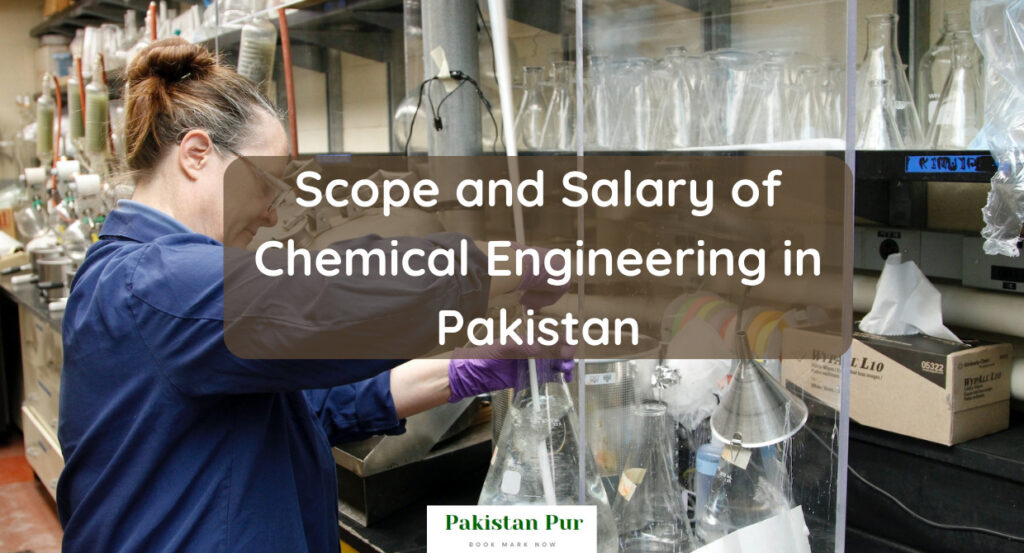Table of Contents
In this blog, we will discuss the scope and salary of chemical engineering in Pakistan. Quick info, the scope of chemical engineering is slowly growing in Pakistan and the salaries in this industry are high.
Scope and Salary of Chemical Engineering in Pakistan
BS Chemical Engineering in Pakistan is a dynamic field with diverse career opportunities across numerous industries.
Despite some reports of limited job opportunities, the scope of this discipline is largely determined by one’s skillset. The program equips students with the knowledge and skills to design and develop processes that convert raw materials into valuable products.
Careers are varied, with roles in industries like oil and gas, pharmaceuticals, food processing, and environmental management.
Let’s explore more on the scope of BS chemical engineering in Pakistan.
Industries for BS Chemical Engineering Graduates
These industries are among the biggest employers of BS Chemical Engineering graduates.
- Oil and Gas Industry: Chemical engineers play a critical role in refining processes, pipeline transport, and storage. They are instrumental in ensuring efficiency, safety, and environmental compliance.
- Pharmaceutical Industry: In this sector, chemical engineers work on drug formulation, production, and quality control. They also help design and manage the manufacturing processes.
- Food Processing Industry: Here, chemical engineers contribute towards improving food processing techniques, and packaging methods, and maintaining food safety standards.
- Cosmetics Industry: Chemical engineering graduates help develop new cosmetic products, improve manufacturing processes, and ensure product safety and compliance.
- Environmental Sector: They play an essential role in waste management, pollution control, and developing sustainable solutions.
- Energy Industry: In this industry, chemical engineers work on processes related to energy conversion, energy efficiency, and developing renewable energy sources.
- Chemical Manufacturing: This includes industries producing chemicals, polymers, dyes, paints, plastics, and other chemical-based products.
- Biotechnology: Chemical engineers apply their skills to biological processes, contributing to areas such as genetic engineering and biofuel production.
Each of these sectors offers unique challenges and opportunities, making chemical engineering a versatile and sought-after degree.
Careers for BS Chemical Engineering Graduates
- Process Engineer: A professional role focused on designing, implementing, controlling, and optimizing industrial processes, especially continuous ones within the chemical, petrochemical, agriculture, mineral processing, advanced material, food, pharmaceutical, and biotechnological industries.
- Chemical Equipment Engineer: In this role, you’ll design equipment and devise processes for manufacturing chemicals and products, such as gasoline, synthetic rubber, plastics, detergents, cement, paper, and pulp, by applying principles and technology of chemistry, physics, and engineering.
- Production Engineer: As a production engineer, your job is to apply engineering principles in the planning, design, operation, and management of production systems in various industries.
- Quality Control Engineer: This role involves ensuring that all output—from goods to services—meets quality standards set by the organization. You will implement inspection activities, identify and resolve production problems, and minimize costs.
- Research and Development Engineer: In R&D, you’ll be at the forefront of developing innovative ideas into tangible products or systems. This could involve working on new pharmaceutical drugs, energy-efficient processes, or other groundbreaking technologies.
- Environmental Engineer: As an environmental engineer, you’ll use the principles of engineering, soil science, biology, and chemistry to develop solutions to environmental problems. This could involve work on recycling, waste disposal, public health, and water and air pollution control.
- Project Engineer: In this role, you’ll plan, coordinate, and execute projects from conception to completion, ensuring they are completed promptly and within budget.
- Safety Engineer: Safety engineers ensure the well-being of people and property. These professionals combine knowledge of an engineering discipline and of health and safety to make sure the chemicals, machinery, software, furniture, and other products won’t cause harm to people or property damage.
Each career path offers unique opportunities to apply the knowledge and skills gained during a BS Chemical Engineering program, making it a versatile degree with broad applicability.
Chemical Engineering Salary in Pakistan
The salary expectations for BS Chemical Engineering graduates in Pakistan vary based on experience and location.
PayScale reports the average salary to be Rs 485,426 annually. Starting salaries can be around Rs 35,000 per month.
In Karachi, salaries for Chemical Engineers can vary widely, with an average of around 970,600 PKR per year. The highest earners in this field can expect up to Rs 425,000 annually. These figures underline the potential for lucrative career paths for BS Chemical Engineering graduates in Pakistan.
Read this guide to know about the universities offering BS chemical engineering in Pakistan, admission criteria, fee structure, and more.
Guide To BS Chemical Engineering In Pakistan 2023
Further Education after BS Chemical Engineering
These are further education paths you can take after completing BS in Chemical Engineering.
- Master’s Degree in Chemical Engineering: This advanced degree offers specialized knowledge and research opportunities in areas such as bioengineering, energy, or nanotechnology. It can enhance your qualifications for leadership positions.
- MBA (Master of Business Administration): Combining engineering skills with business acumen can open doors in management, entrepreneurship, and consulting.
- Ph.D. in Chemical Engineering: A doctorate is ideal for those interested in academic careers or high-level research and development roles in industry.
- Professional Engineering (PE) License: While not a degree, obtaining this license can increase job prospects and credibility in the field.
- Postgraduate Certificates: These focused programs offer specialized knowledge in areas such as petroleum engineering or environmental engineering.
- Master’s in Patent Law: For engineers interested in intellectual property rights, a degree in patent law can lead to a career as a patent examiner or intellectual property lawyer.
Remember, the best choice for further education depends on your career goals and interests. Be sure to research each option thoroughly before making a decision.



